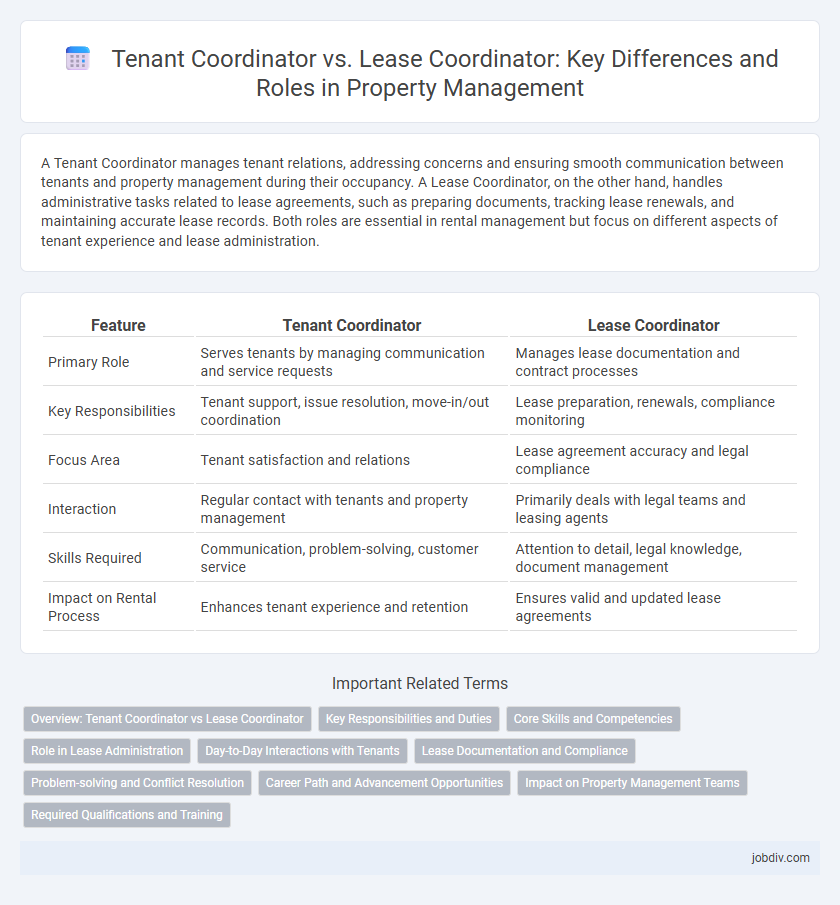A Tenant Coordinator manages tenant relations, addressing concerns and ensuring smooth communication between tenants and property management during their occupancy. A Lease Coordinator, on the other hand, handles administrative tasks related to lease agreements, such as preparing documents, tracking lease renewals, and maintaining accurate lease records. Both roles are essential in rental management but focus on different aspects of tenant experience and lease administration.
Table of Comparison
| Feature | Tenant Coordinator | Lease Coordinator |
|---|---|---|
| Primary Role | Serves tenants by managing communication and service requests | Manages lease documentation and contract processes |
| Key Responsibilities | Tenant support, issue resolution, move-in/out coordination | Lease preparation, renewals, compliance monitoring |
| Focus Area | Tenant satisfaction and relations | Lease agreement accuracy and legal compliance |
| Interaction | Regular contact with tenants and property management | Primarily deals with legal teams and leasing agents |
| Skills Required | Communication, problem-solving, customer service | Attention to detail, legal knowledge, document management |
| Impact on Rental Process | Enhances tenant experience and retention | Ensures valid and updated lease agreements |
Overview: Tenant Coordinator vs Lease Coordinator
A Tenant Coordinator primarily manages tenant communications, move-ins, and ongoing tenant relations to ensure satisfaction within rental properties. A Lease Coordinator focuses on lease administration, including lease agreements, renewals, and compliance with rental policies. Both roles are critical for efficient property management but specialize in different aspects of tenant and lease lifecycle management.
Key Responsibilities and Duties
A Tenant Coordinator primarily manages tenant relations, addressing tenant inquiries, coordinating move-ins and move-outs, and ensuring tenant satisfaction within rental properties. A Lease Coordinator focuses on lease administration, including preparing lease documents, tracking lease renewals, and ensuring compliance with leasing terms and policies. Both roles require strong communication skills but differ in their emphasis on tenant engagement versus lease management.
Core Skills and Competencies
Tenant Coordinators excel in communication, conflict resolution, and tenant relationship management, ensuring seamless move-ins and addressing tenant concerns promptly. Lease Coordinators specialize in lease administration, contract interpretation, and regulatory compliance, managing lease execution and documentation efficiently. Both roles require strong organizational skills and attention to detail, but Tenant Coordinators prioritize customer service while Lease Coordinators focus on legal and contractual expertise.
Role in Lease Administration
Tenant Coordinators primarily manage tenant relations, addressing tenant concerns and ensuring lease compliance during occupancy, while Lease Coordinators focus on administrative tasks such as drafting, reviewing, and maintaining lease documentation. Lease Coordinators handle lease abstracts, renewal tracking, and coordination with legal teams to ensure accurate lease execution. Effective lease administration requires collaboration between both roles to streamline tenant satisfaction and lease management processes.
Day-to-Day Interactions with Tenants
A Tenant Coordinator manages day-to-day tenant communications, addressing maintenance requests, resolving tenant concerns, and ensuring a positive living experience. A Lease Coordinator focuses on lease-related tasks such as preparing lease agreements, processing renewals, and handling move-in and move-out documentation. Tenant Coordinators engage directly with tenants regularly, while Lease Coordinators primarily interact during leasing transactions and tenant onboarding processes.
Lease Documentation and Compliance
Tenant Coordinators primarily manage lease documentation by ensuring accurate collection and organization of tenant records, while Lease Coordinators focus on compliance by reviewing lease agreements to align with regulatory standards and company policies. Lease Coordinators handle the verification of lease terms, amendments, and renewals, ensuring all documents meet legal requirements and internal controls. Efficient coordination between both roles optimizes lease administration, minimizes risks, and enhances tenant relationship management.
Problem-solving and Conflict Resolution
Tenant Coordinators specialize in tenant relations by addressing disputes and facilitating communication to resolve conflicts quickly and maintain tenant satisfaction. Lease Coordinators focus on managing lease documentation and compliance, ensuring contractual obligations are met to prevent misunderstandings and legal issues. Effective problem-solving in rentals requires both roles to collaborate, combining tenant-focused conflict resolution with lease-centered administrative precision.
Career Path and Advancement Opportunities
Tenant Coordinators primarily focus on managing tenant relationships, addressing concerns, and facilitating communication between tenants and property management, which positions them well for advancement into property management or tenant relations specialist roles. Lease Coordinators specialize in preparing, reviewing, and managing lease agreements, making their career path more aligned with legal, compliance, or leasing management positions within real estate firms. Both roles offer distinct career trajectories, with Tenant Coordinators often moving towards operations and customer service leadership, while Lease Coordinators advance towards leasing administration and contract negotiation expertise.
Impact on Property Management Teams
Tenant Coordinators streamline tenant relations by addressing concerns and facilitating communication, significantly reducing response times and improving overall tenant satisfaction. Lease Coordinators manage lease documentation and compliance, ensuring accurate record-keeping and minimizing legal risks for property management teams. Both roles enhance operational efficiency but Tenant Coordinators directly influence tenant experience, while Lease Coordinators strengthen contract administration and regulatory adherence.
Required Qualifications and Training
Tenant Coordinators require strong communication skills and experience in tenant relations, often holding a background in property management or customer service, with additional training in conflict resolution and lease administration. Lease Coordinators need detailed knowledge of lease agreements, contract law basics, and property regulations, typically supported by formal education in real estate or legal studies and specialized training in document management and compliance. Both roles benefit from proficiency in property management software and ongoing professional development to stay updated on industry standards and legal requirements.
Tenant Coordinator vs Lease Coordinator Infographic

 jobdiv.com
jobdiv.com